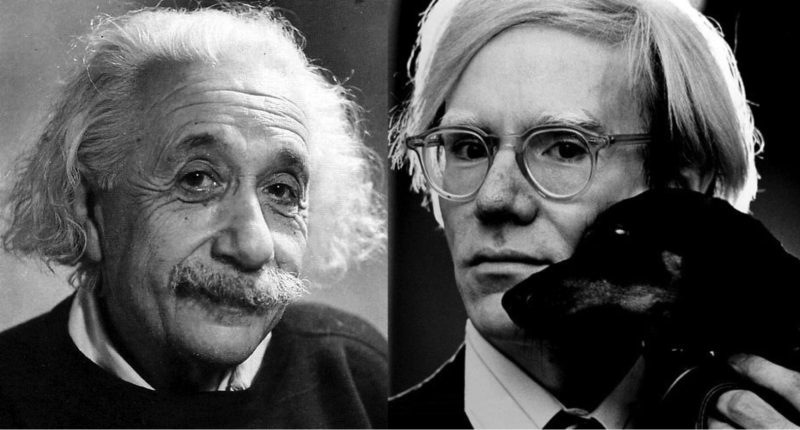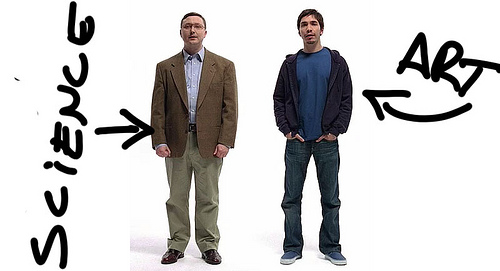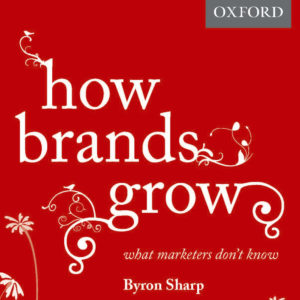
19 Jan “Science bitches”. Art vs. science and marketing in a post truth world.
The role of marketing science.
 Is marketing an art or a science? Is marketing science actually a thing? In a post truth, fake news world, unsurprisingly the debate about the science of marketing rages on.
Is marketing an art or a science? Is marketing science actually a thing? In a post truth, fake news world, unsurprisingly the debate about the science of marketing rages on.
Marie Oldham made an impassioned argument as to why Byron Sharp may not always be right in Campaign last week. http://www.campaignlive.co.uk/article/challenge-byron-sharp-grow-brand/1419995
In a slightly out of character, pro Byron and somewhat conciliatory piece, Mark Ritson came to his defence in Marketing Week. https://www.marketingweek.com/2017/01/18/mark-ritson-thank-byron-sharp/
So far, so much fun. Both opinions are worth reading and digesting. I’m not picking a fight with any of these people. But as usual it’s the comments thread that reveals the most. Mark’s argument was that by bringing the science back to marketing, Byron is doing our discipline a deeply fundamental and important service. One commentator disagreed;
“Real marketing is an art not a science, because while it might assist people like yourself, to attempt to argue otherwise, those in the real world know that is complete and utter bollocks.”
The one thing that infuriates me most (and let’s face it there’s a lot to be infuriated by in marketing at the moment), is the postulation that marketing is a creative discipline, led by creative thinking. Marketing art over marketing science. It’s all too common. Never in the history of arguments about marketing has the horse been so clearly tethered ahead of the cart, by so many people, so often. Usually people with the word ‘creative’ in their job title. As redundant an epithet in today’s marketing world as ‘digital’ in my mind.
Marketing should start with science.
My argument is that marketing’s job is still to sell more stuff, to more people, on more occasions, at higher prices, in order to make more money. Last I checked, therefore marketing should start with a little maths. Maths, notably, being one of the sciences. The loss of sight of that goal by so many in our profession places them surfing squarely on the front face of the Tsunami of Horseshit, so well described by Prof. Ritson earlier in 2016. (By the way ToH are still my new favourite indie band).
Then we might segment, target and position. We ought to do so using qualitative and quantitative analysis (that’s marketing science, right there). Then, once we get past the hard analytical work of uncovering insights and tensions. Once we stop digging into behavioural science about motivations and heuristics and biases. Once we have finished quantifying sizes of prize and tensions and drivers and making tough rational trade offs between strategies and approaches. Then, we may, if we are lucky, indulge in a little bit of creative exposition, as we write a brand manifesto or some other such fluff. According to Byron Sharp and others, that’s an utter waste of time in terms of affecting behaviour. I’m conflicted about that. But I do know that 90% of this exercise is analysis, research, and deductive reasoning, long before we get to the inductive. Flashes of inspiration come after weeks and weeks of hard analytical slog.
Even execution should be science led.
As we move from brand strategy into execution, we might then zero base our budget. Maths again sadly. Hard maths that’s very hard to do. So hard, its a discipline not yet mastered by (m)any. As a result we may choose to do work, on pricing (damn math again), architecture (research led work into choice drivers), practical availability (you could try ‘creating’ a planogram, or a range review, but I reckon Woolies or Coles aren’t going to buy it) and a host of other, far from creative activities. We will research and identify our distinctive brand assets. Not draw and design them mind, research and identify. And yes, we might decide to make some advertising. At least that bit sounds creative.
But sadly it isn’t. If we, as marketers do our job right we set goals and objectives. Tram lines and boundaries. Work out quantifiably (there’s that pesky marketing science again) where the audience is and when they are receptive (so much maths it hurts my head). If we start writing creative ideas, we just fucked up the whole process. If we are good at our job we then pass the ball to someone whose job it is to do ‘creativity’. And the first job of a good creative is to understand what all the science that came before is trying to tell them. Then finally, we might be truly creative for a moment, right at the end of the process.
Process is creativity’s ally, not its enemy.
My second pet hate by the way is those who eschew process as ‘anti-creative’. Such thinking is at best self serving, at worst downright dumb. But marketing is a process. Not necessarily a process that has to be followed in sequential order. But even if you choose to start with gut and instinct, my point of view is you then need to go and back it up with science. Or risk frittering away million of dollars of shareholders’ money. And with it more importantly, goes the reputation of our discipline.
Marketing unquestionably has a creative element. The advertising type of creativity has long since proven its ability to deliver results, albeit on the shifting sands of the new media landscape. A more liberal interpretation of creative thinking should be littered amongst the processes and science and strategy of this job. Intuitive leaps and big strategic thoughts are the stuff of breakthroughs. If, and only if, you are leaping off a launch-pad of analytical thought. Only when the art is based on marketing science.
Creativity is a false idol
 But our willingness to worship at the knee of the creative god is a cornerstone of all that is wrong at the moment. It’s why ‘content marketing’ is a thing (it isn’t, its just advertising). Why we have actual conversations about making advertising people truly want to engage with (they don’t, really, they don’t). Why too many creative directors have corner offices and egos and attitudes that Don Draper would shudder at (I’m looking at you, Kevin Roberts). I’d be like that too, if you put me on that high a pedestal. And told me its my job to save the brand. The deification of creativity is why so much innovation fails. It’s why so many ads look good, but deliver nothing. It’s why the CMO is not that well regarded in the boardroom, in far too many companies.
But our willingness to worship at the knee of the creative god is a cornerstone of all that is wrong at the moment. It’s why ‘content marketing’ is a thing (it isn’t, its just advertising). Why we have actual conversations about making advertising people truly want to engage with (they don’t, really, they don’t). Why too many creative directors have corner offices and egos and attitudes that Don Draper would shudder at (I’m looking at you, Kevin Roberts). I’d be like that too, if you put me on that high a pedestal. And told me its my job to save the brand. The deification of creativity is why so much innovation fails. It’s why so many ads look good, but deliver nothing. It’s why the CMO is not that well regarded in the boardroom, in far too many companies.
How brands grow
I love creative people. In some ways, I am one. By most standards, not. I love the creative aspects of marketing. And I recognise their power and worth. But we need to put them back in their place. Firmly behind the horse of marketing strategy and marketing science. It’s not just that we are not reading, or reading and dismissing, the most important marketing book of our lifetime. It’s that we are not reading any of the books, or articles, or case studies, or marketing week columns, or blog posts that should be helping us solve the increasingly complex problems we face. You don’t have to agree with Byron to agree that the way Byron does things is right. We seem to have abandoned science for the art of wildly guessing. Strategy for tactics. Expertise for intuition. Intelligence for instinct. To an almost anti-Darwinian level. We have abandoned marketing science for an echo chamber of pleas and cries about the role and importance of art. We have become so focused on the creative outcomes, we have forgotten about the problems.
The problems of selling more stuff, to more people, on more occasions, at higher prices. You know, the job of marketing.
Marketing Science FTW.
Someone sciencey once said ‘If I had an hour to solve a problem I’d spend 55 minutes thinking about the problem and 5 minutes thinking about solutions’. It’s as good an analogy for marketing as I can come up with. Maybe I am just not creative enough to have an original thought. And too happy to stand on the overburdened shoulders of giants. Maybe I won’t even get my fifteen minutes of artistic fame. But whilst I know those last five minutes of fame grabbing attention are important. They do not define the job. They are not marketing. Real marketing is marketing science first, marketing art second. To argue otherwise is complete and utter bollocks.




Mike Wilson
Posted at 15:46h, 19 JanuaryMuch as it pains me to say it, you are 100% correct. (The pain is in having to agree with you, not the science trumps art bit). Sadly I heard a senior executive trotting out the old ‘50% of my advertising is wasted..’ nonsense only last week. *sigh* ps I understand John Peel also said that Springsteen is bollocks
Jon Bradshaw
Posted at 15:49h, 19 JanuaryI have no issue agreeing with you or John Peel. Both of you are old, bearded wise men. Only one of you has dubious musical taste.
Darren Woolley
Posted at 19:19h, 19 JanuaryWho ever said their was no art in science. Having studies and worked in medical science for almost a decade and virtually twice as long in marketing I can tell you the two are not diametrically opposed. There is art in science and there is science in art.
Dan Woodall
Posted at 13:00h, 20 JanuaryI think part of the problem is the very narrow definition of ‘creativity’ that seems to be applied when discussing marketing. The ‘science’ part of marketing requires huge creativity. Drawing insights out of data is a highly creative process. Figuring out how to even get the data you need is even more so. Structuring and creating a meaningful business case requires an extraordinary level of original thinking and creativity (and no, I don’t mean as in ‘creative accounting’). IMO this stuff is much harder than the ‘creative’ bits of marketing.
However, in our profession we seem to be fixated on creativity being ‘writing and directing a TV ad’.
Maybe that’s it. Perhaps I’ll put it out there. Many of the ‘creative types’ working in marketing are far from it, and lack the skills, capability and talent to be truly creative across the whole of the marketing process. All they know how to do is the easy bit at the end.
Jeroen Thissen
Posted at 23:37h, 15 FebruaryDan Woodall FTW
Tom Gustar
Posted at 11:00h, 10 JulyIt’s both. It’s like asking whether the glass is half full or half empty. It’s both too!
Jon Bradshaw
Posted at 11:11h, 10 JulyTruly both. I hope I made that point. But both is not the prevailing published opinion. There’s no week long over publicised love-fest in the South of France for marketing scientists. Those of us who are more strategy and science oriented understand and respect the role of creativity in all the forms Dan articulates. Sadly those with a creative megaphone aren’t so even handed.
Tom Gustar
Posted at 09:40h, 17 JulyThe long version of my comment would be in agreement with your assertion that it starts with science. If we look to Robert Chialdini and his classic work ” Influence” we see the same behavioral patterns in human response to a stimulus. This is definitely where the science starts for me at least. Knowing, to some degree that response behaviors are somewhat predictable can guide our hand in the science. Tha art is a smaller portion that decides how to approach the science.